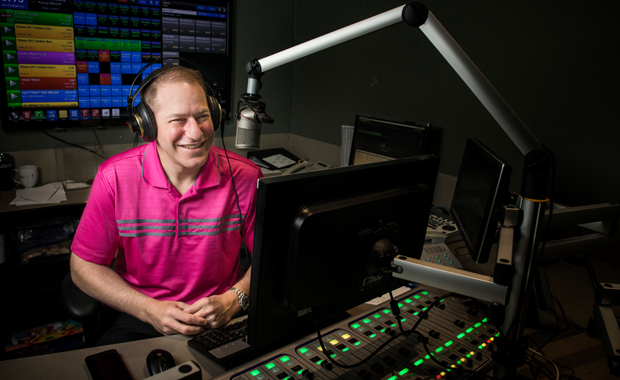The Ottawa Hospital Leads the Way in Life-Saving Immunotherapy Research
Research and Innovations Radio host Stuart Schwartz finds out shocking news after suffering from symptoms that were thought to be caused by a virus.

Radio host and Ottawa Senators public announcer Stuart Schwartz knew something wasn’t right. Initially, his symptoms were thought to be caused by a virus, but soon found out that his fatigue, migraines, skin bruising, and three hour-long nosebleeds were indications of something more serious. In January 2016, a hematologist determined he had leukemia.
He was shocked, but told doctors at The Ottawa Hospital to “give it to him straight.” They explained that he was in desperate need of blood transfusions, and chemotherapy would begin four days after being admitted to hospital. When Schwartz asked, “can we beat it?” his health care team gave him a confident “yes”.
By April, he was already in remission. “I thought I was out of the woods,” says the 44-year-old father of two, “instead, I found myself staring down the barrel of a gun. I still needed a stem cell bone marrow transplant to tackle it.” He decided to take action, launching an online campaign using the hashtag #StuStrong to help raise funds for stem cell research at The Ottawa Hospital. To date, the campaign has raised $315,000.
Immunotherapy at the forefront of cancer research
Fortunately for Schwartz, he had one of Canada’s leading blood cancer specialists help him through the next steps of his cancer journey. Dr. Natasha Kekre, a hematologist and clinician scientist with The Ottawa Hospital, is focusing efforts on discovering new and innovative ways to treat cancer, including CAR-T cell and virus-infected immunotherapy, which use the body’s immune system to attack cancer cells by genetically modifying a patient’s own T-cells.
CAR-T cell therapy has shown great promise for patients with chronic lymphocytic leukemia, as well as some forms of lymphoma, in clinical trials conducted in the United States and Europe. Dr. Kekre and her colleagues are determined to help Canadians have access to this new treatment, with hopes for a clinical trial that will target blood cancers in January 2019.
Offering homegrown solutions to Canadian patients
One of the challenges has been getting CAR-T cells. Currently, just two U.S.-based companies are offering them, and the demand is greater than the available supply. “At The Ottawa Hospital, we are building a platform that will enable us to make our own CAR-T cells,” she explains. “We are working with other provinces to have production facilities and transplant centres across Canada. This type of immunotherapy is a game changer for sure. We haven’t seen anything this promising in decades.”
Patients like Schwartz have a fighting chance at beating cancer with these new therapies. “I’m glad I put my faith in Dr. Kekre and her team at The Ottawa Hospital to save my life,” he says. “It was nothing but a positive experience.” Following his stem cell transplant, he was given good news: he’s officially in remission and now back to work.
Funding is critical to give patients wider access to immunotherapy like CAR-T cell therapy. While the government provides some financing through organizations like BioCanRx, which operates at The Ottawa Hospital, more money is needed to make The Ottawa Hospital’s ambitious plans a reality.
“No country in the world has what we are trying to create,” says Dr. Kekre. “The Ottawa Hospital has amazing lab scientists and clinicians. The things we want to do require a lot of financial support. This research is ground-breaking and I can’t wait to see where it will go in the future."
